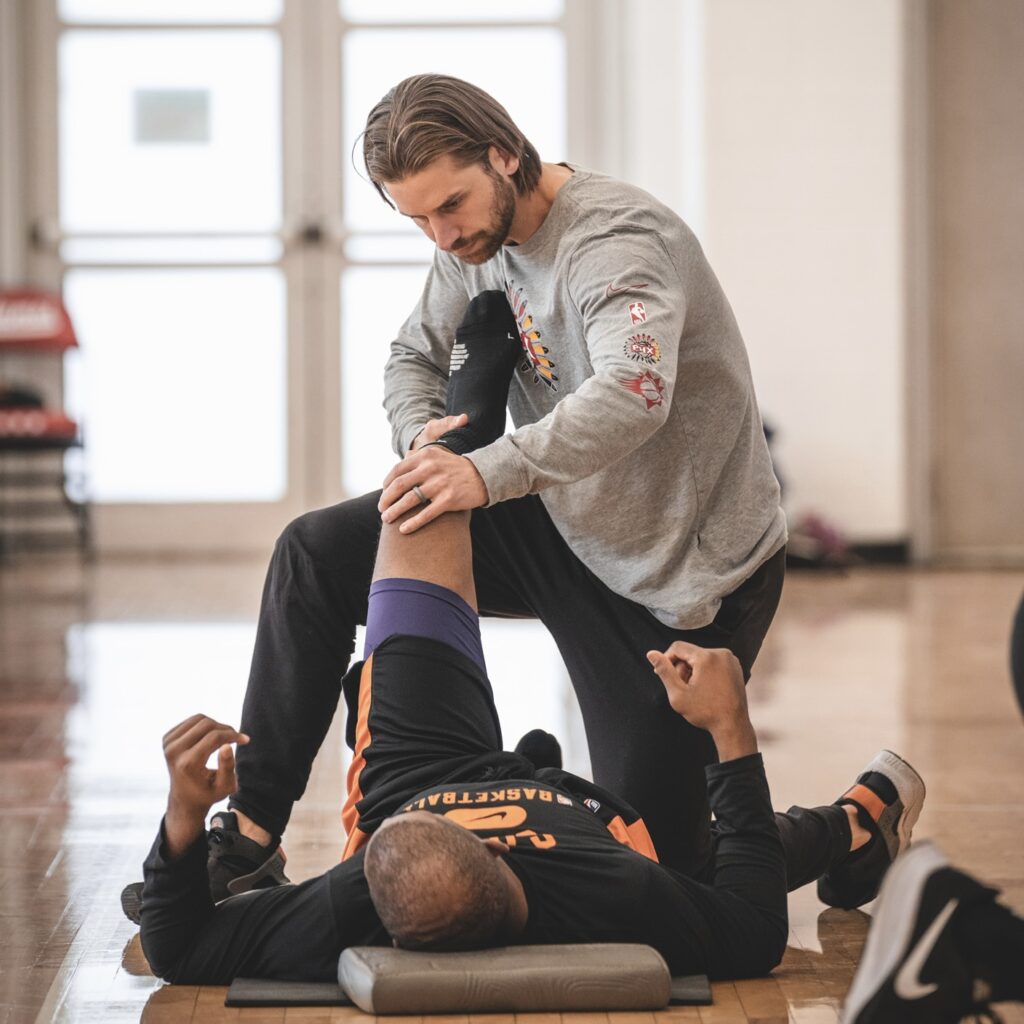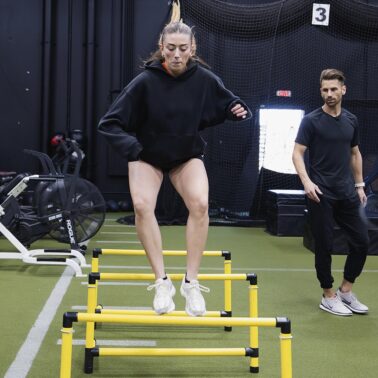“Collagen, the most abundant protein in the human body, forms a network of fibers that provide structure and strength to connective tissues.”
Adam Loiacono
What You Will Learn
- Integral Role of Collagen: Collagen’s structural role in connective tissues like tendons and cartilage is fundamental, highlighting its importance in maintaining joint mobility and strength.
- Benefits of Collagen Supplementation: Regular collagen supplementation has shown promising results in enhancing tendon strength and flexibility, crucial for both athletic performance and daily activities.
- Collagen’s Impact on Cartilage Health: Long-term collagen supplementation can aid in the repair and rebuilding of cartilage, offering potential relief from joint pain and stiffness associated with chronic cartilage injuries.
Collagen supplements have become increasingly popular in the realms of sports medicine and rehabilitation. Known as the building block of tendons and cartilage, collagen plays a crucial role in the healing and strengthening of these structures. This guide dives into the science behind collagen supplementation, its necessary dosing alongside Vitamin C, and its effectiveness in managing tendon and cartilage injuries.
The Role of Collagen in the Body
Collagen, known for its structural role in the human body, is pivotal in the makeup of connective tissues, including tendons and cartilage. As the most abundant protein, it forms a network of fibers that provide structure and strength to these tissues. In tendons, which serve as critical connectors between muscles and bones, collagen fibers align in parallel formations. The parallel formations enable the tendons to withstand the substantial tensile forces exerted during muscle contractions. This alignment not only supports the role of strength but also facilitates the transfer of force, allowing for efficient movement.
In cartilage, collagen’s role is slightly different but equally important. Here, it forms a mesh-like structure that supports chondrocytes, the cells responsible for maintaining cartilage health. This unique arrangement grants cartilage its characteristic resilience and ability to absorb shocks, protecting our joints from the impact of daily activities.
However, the body’s ability to produce collagen naturally diminishes with age. This decline is a key factor in the aging process of connective tissues, often leading to a reduction in tendon elasticity and cartilage strength. The result can be an increased susceptibility to injuries and degenerative joint diseases like osteoarthritis. Joint pain, stiffness, and reduced mobility often accompany this decline in collagen, significantly impacting the quality of life.
Furthermore, factors such as poor nutrition and smoking can accelerate collagen degradation, compounding the effects of aging. This makes it crucial to support the body’s collagen production through a balanced diet, lifestyle choices, and potentially, supplementation, to maintain the health and functionality of the musculoskeletal system.
Collagen Supplementation for Tendon Strength
The growing interest in collagen supplementation as a therapeutic option for tendon health is grounded in compelling research findings. Tendons, composed primarily of collagen, are vital in facilitating movement and bearing mechanical loads. Their health and functionality are critical for athletic performance as well as daily activities.
This particular study has shed light on the potential benefits of collagen supplementation for tendons. This research revealed that regular intake of collagen supplements could significantly enhance tendon strength and flexibility. These improvements are believed to stem from the role of collagen in the synthesis and repair of tendon tissue.
The study’s findings are particularly relevant given that tendons are relatively avascular and have a slow metabolic rate, leading to typically prolonged recovery times following injury. Collagen supplements could provide the necessary amino acids, primarily proline and glycine, that are essential for the formation of new collagen fibers within the tendons. This supplementation may thus accelerate the repair process and reinforce the structural integrity of the tendon matrix.
Moreover, the improved flexibility associated with collagen supplementation is a crucial factor in injury prevention. More flexible tendons can better absorb impacts and adapt to stress, reducing the risk of tears and strains. This aspect is particularly beneficial for athletes or individuals engaged in regular physical activity, where the tendons are routinely subjected to high stress.
It is also worth noting that the effectiveness of collagen supplementation is enhanced when combined with physical therapy and targeted exercise regimens. Such combinations can synergistically promote tendon healing and optimize functional recovery. This holistic approach to tendon health underscores the importance of a comprehensive treatment strategy that incorporates both nutritional and physical rehabilitation components.
Collagen for Chronic Cartilage Injuries
The efficacy of collagen in the context of chronic cartilage injuries is a topic of significant interest in sports medicine and orthopedics. Cartilage, the smooth, rubber-like tissue that covers the ends of bones at joints, relies heavily on collagen for its structure and function. Unlike other tissues, cartilage lacks blood vessels, making its repair and regeneration processes slow and often incomplete, especially in cases of chronic injury or wear-and-tear associated with aging.
We can often learn valuable information from populations with disease. In the contest of cartilage, no better population is then patients with knee osteoarthritis. In this lengthy article (grab a cup of coffee and a healthy does of L-theanine) the researchers examined the available literature on the use of collagen supplementation and any positive outcomes on cartilage repair.
It demonstrated that long-term intake of collagen supplements could improve joint pain in physically active individuals, hinting at possible improvements in cartilage integrity. These findings imply that collagen supplementation might also positively impact cartilage health in osteoarthritis patients, possibly by supporting joint health and reducing deterioration risks. However, this inference requires further research directly involving osteoarthritis patients to confirm the benefits are completely true.
The proposed mechanism behind collagen’s beneficial impact involves its integration into the cartilage matrix. Collagen molecules are thought to incorporate into the existing cartilage, aiding in the repair and rebuilding of this tissue. This process can help restore the smooth, cushioning properties of the cartilage, thereby reducing joint pain and stiffness.
Moreover, collagen supplementation may enhance the synthesis of other cartilage components, such as proteoglycans and hyaluronic acid, which are essential for maintaining the elasticity and hydration of the joint. By improving the overall health of the cartilage matrix, collagen supplements can play a crucial role in enhancing joint mobility and function, which are often compromised in chronic cartilage injuries.
Different Types of Collagen Supplements
Collagen supplements, catering to a range of preferences and absorption capabilities, are available in diverse forms, including powders, capsules, and liquids. Each form offers unique benefits, making collagen supplementation accessible and convenient for various lifestyles and health needs.
Hydrolyzed Collagen (Collagen Peptides): This form is particularly noteworthy for its bioavailability. Hydrolyzed collagen is broken down into smaller units, known as peptides, which are more easily absorbed by the body. This process increases the efficiency with which the body can utilize the amino acids in collagen, making it an ideal choice for those seeking quick and effective results. Powdered forms of hydrolyzed collagen can be conveniently mixed into liquids like smoothies, coffee, or even water, providing a seamless integration into daily routines.
Capsule and Liquid Forms: For those who prefer more traditional methods of supplementation, collagen is also available in capsule and liquid forms. Capsules offer the benefit of precise dosage and are easy to incorporate into a daily supplement regimen. Liquid collagen, on the other hand, may be preferred for its ease of digestion and rapid absorption, though it often comes with the caveat of a taste that might not appeal to all.
Types of Collagen: The specific type of collagen in the supplement plays a pivotal role in its targeted benefits. Type I collagen, the most abundant in the human body, is particularly beneficial for tendons, which require strength and flexibility. Tendons, being largely composed of Type I collagen, respond well to supplementation of the same type, potentially enhancing tendon resilience and function.
Always consult with a healthcare provider before starting any new supplement regimen, especially for those with existing health conditions or those taking other medications.
Recommended Dosing of Collagen and Vitamin C
The effectiveness of collagen supplements is often enhanced when taken with Vitamin C, a critical cofactor in collagen synthesis. The recommended dosing is about 15-20 grams of collagen peptides, taken daily in combination with at least 50 mg of Vitamin C. This combination not only promotes collagen production but also ensures its proper deposition in the tendons.
Safety and Side Effects
Generally, collagen supplements are considered safe with minimal side effects. However, it’s important to consult with a healthcare provider before starting any new supplement, especially for individuals with existing health conditions or those taking other medications.
Conclusion
Collagen supplements, particularly when paired with Vitamin C, offer a promising avenue for strengthening tendons and improving chronic cartilage injuries. While they are not a cure-all, they can be a valuable component of a comprehensive rehabilitation plan for musculoskeletal injuries. Always consult with healthcare professionals to determine the best course of action for individual health needs.



